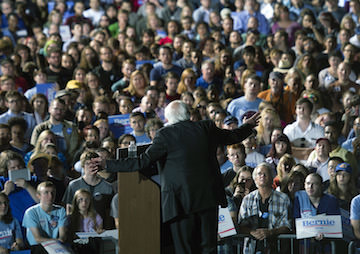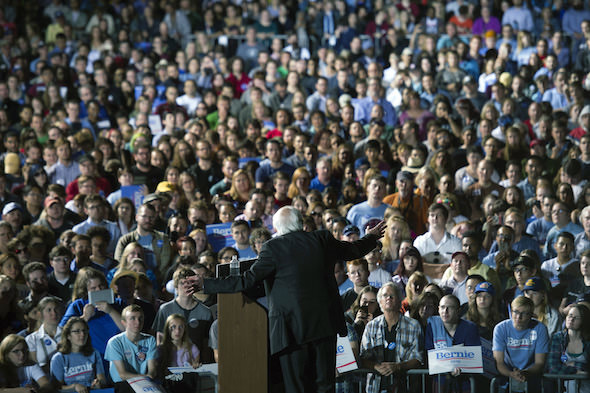Sanders and His Supporters May Have to Overcome Democratic Party Superdelegates
Bernie Sanders won the popular vote in the New Hampshire primary by a large margin, but Hillary Clinton could take more of the state's delegates to the nominating convention. Not to fear, though—Sanders supporters can overcome this anti-democratic system.

The Democratic Party’s superdelegate system functions as a bulwark against the popular will in the nomination process. (Cliff Owen / AP)
You may have heard that Bernie Sanders’ chances of gaining the Democratic Party’s nomination are under threat by the superdelegate system—an anti-democratic mechanism peculiar to the party.
“Superdelegates,” explains Trevor Timm at The Guardian, are “700 or so [members of Congress, governors, mayors and other party elites] who aren’t elected by anyone during the primary process and are free to vote any way they want at the convention.”
Many of these delegates indicated their support for Hillary Clinton early in the race, and their role in the primary process has meant that, for the time being at least, Clinton “basically walked away with the same amount of total delegates as Bernie Sanders after the New Hampshire primary Tuesday night.”
Timm continues:
According to University of Georgia lecturer Josh Putnam, superdelegates exist solely to allow DNC elites to better control who ultimately becomes their nominee. “The reason superdelegates came into being in the interim period between the 1980 and 1984 elections was to allow the party establishment an increased voice in the nomination process,” he wrote on his blog in 2009.
While they only make up about one-sixth of the total delegates, they are more than enough to swing the election either way – even if a candidate clearly wins a majority of votes and regular delegates during the primary season. […]
Superdelegates, you may remember, were an issue in the 2008 primary race between Barack Obama and Clinton as well, where she held an early lead in the superdelegate count despite the fact that Obama was winning more primaries. But Sanders finds himself in a far different situation than Obama did. Obama had amassed a significant amount of superdelegates of his own, and while he was a fresh face in the party, he was always considered friendly to the party’s elite. Superdelegates were much more likely to switch to him once it was clear that he would win, which they ultimately did.
Sanders, on the other hand, is losing the superdelegate race by a catastrophic amount. Party elites who have announced who they are supporting have almost universally broken towards Clinton’s camp. A recent unofficial count put Clinton’s advantage at a staggering 355-14. And given how Sanders falls well outside the establishment compared to Obama in 2008, it’s hard to see how he can gain a significant number to make up for Clinton’s lead – meaning it’s more likely that superdelegates would at least want to tip the scales in favor of Clinton, even if he ends up winning more primaries.
Sanders supporters are taking this threat to their candidate seriously, but they don’t need to panic. According to Paste magazine contributor Shane Ryan, if Democratic voters demonstrate massive, unambiguous support for Sanders nationwide by continuing to favor him in the primaries, superdelegates are unlikely to vote for Clinton at the party’s nominating convention in July.
“Superdelegates have never decided a Democratic nomination,” Ryan explains. “It would be insane, even by the corrupt standards of the Democratic National Committee, if a small group of party elites went against the will of the people to choose the presidential nominee”:
This has already been an incredibly tense election, and Sanders voters are already expressing their unwillingness to vote for Clinton in the general election. When you look at the astounding numbers from Iowa and New Hampshire, where more than 80 percent of young voters have chosen Sanders over Clinton, regardless of gender, it’s clear that Clinton already finds herself in a very tenuous position for the general election. It will be tough to motivate young supporters, but any hint that Bernie was screwed by the establishment will result in total abandonment.
Democrats win when turnout is high, and if the DNC decides to go against the will of the people and force Clinton down the electorate’s throat, they’d be committing political suicide.
The important thing to know here is that Superdelegates are merely pledged to a candidate. We know who they support because they’ve stated it publicly, or been asked by journalists. They are not committed, and can change at any time. If Bernie Sanders wins the popular vote, he will be the nominee. End of story.
In addition to the reasons for optimism offered by Ryan, Sanders’ supporters have at least two formidable countermeasures against party elites: the mobilization of massive, media-ready demonstrations held at the party’s nominating convention, and the press, which they can use to expose delegates who dare to vote against the will of their constituents.
To this end, MoveOn.org launched a petition to pressure superdelegates to vote with voters (more than 135,000 people signed in the first 24 hours), and talk on social media suggests that organizers from various groups are already planning demonstrations.
Ryan’s exploration of the superdelegate system and its role in this race is quite detailed. Continue reading it here.
—Posted by Alexander Reed Kelly.
Independent journalism is under threat and overshadowed by heavily funded mainstream media.
You can help level the playing field. Become a member.
Your tax-deductible contribution keeps us digging beneath the headlines to give you thought-provoking, investigative reporting and analysis that unearths what's really happening- without compromise.
Give today to support our courageous, independent journalists.






You need to be a supporter to comment.
There are currently no responses to this article.
Be the first to respond.